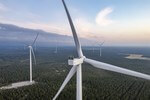News Release from Vestas
Wind Industry Profile of
01/14/2011
Denamrk - Wind energy Vestas’ sustainability figures now available online
Follow the electricity usage for Vestas Blades. Or, maybe view the development in Energy Consumption for Vestas in Spain.
To help improve performance in sustainability, Vestas is opening up by letting the entire world follow its progress towards becoming a more sustainable company.
Now you can see how any part of Vestas is doing when it comes to sustainability. Data from each country is accessible via interactive curves and figures on Vestas.com.
“First and foremost, we as a company have an obligation to constantly improve our performance in sustainability matters,” Reporting Manager Klaus Rønde, Sustainability, says of the background.
“When we make it easier to understand and access our numbers, we are likely to have more people outside Vestas following us. Secondly, I feel confident that this level of detail will make more employees and managers take ownership and consciously help Vestas become more and more sustainable.”
“We used to publish 40 PDFs containing 4 pages full of figures for each factory and larger sales units every year. With this new way of presenting our ongoing performance numbers we strive to broaden the audience significantly. I’m sure this will help not only analysts but also journalists, shareholders, customers, employees, or perhaps even students, understand Vestas better.”
The ‘new’ figures can be viewed in various ways depending on what you want to dive into or what locations you need to compare. And, there is a plan to expand the functionality of the site and increase the amount of different data you can follow.
The next step for the project is to include more of Vestas’ sustainability data, as well as targets. As it is right now, it is possible to follow and compare energy and water consumption, waste and CO2 emission, as well as injuries and headcount.
“This is a tool that will help factories, Business Units and others observe and illustrate if immediate performance is on target. It will also help link our numbers and improve awareness and understanding even more.”
Vestas has a policy to purchase renewable electricity where available. By procuring renewable electricity and in collaboration with suppliers and authorities, Vestas seeks to ensure better access to renewable electricity. To meet Vestas' renewable energy goals, a wind power plant has been established internally to balance out electricity bought in countries where Vestas is not able to buy renewable electricity.
Vestas has also joined the World Business Council Manifesto for Energy Efficiency in Buildings, whose subscribers work proactively for lower energy consumption.
The low utilization of Vestas’ production capacity in 2010 has led to a poor trend in the energy consumption per MW produced and shipped.
For 2010 Vestas has a target of 55 per cent renewable energy consumed. Current performance is 44 per cent. A precondition for meeting the target is that the proportion of renewable electricity is increased to more than 90 per cent. Vestas will henceforth build wind turbines for in-house use in order to balance the energy consumption from areas in which it is still not possible to buy green energy.
On average over the last four quarters, Vestas facilities worldwide used 12.7 percent more energy to produce a wind turbine than the average of a quarter before. The company also used 38.8 percent more energy per wind turbine than last year's average. In 2009, for example, the average was about 88 MWh/MW, meaning the wind turbines had to run at full speed for 88 hours to produce enough energy to make up for Vestas' production.
On average over the last four quarters, Vestas facilities worldwide succeeded in drawing more of their energy from renewable sources. The company's renewable energy use worldwide was 52.6 percent, up from last quarter's average of 51.7 percent and up from an average of 49.1 percent last year.
Vestas facilities worldwide also used less renewable electricity. The company's renewable electricity use worldwide averaged 93.3 percent over the last four quarters, down from an average of 93.9 percent last quarter but up from an average of 84.9 percent last year.
Vestas facilities worldwide increased their total average energy consumption by 12.1 percent over the last four quarters compared to the average from a quarter before. Energy use also increased by 7.1 percent over last year's average.
For more information on this article or if you would like to know more about what www.windfair.net can offer, please do not hesitate to contact Trevor Sievert at ts@windfair.net
www.windfair.net is the largest international B2B Internet platform – ultimately designed for connecting wind energy enthusiasts and companies across the globe!
To help improve performance in sustainability, Vestas is opening up by letting the entire world follow its progress towards becoming a more sustainable company.
Now you can see how any part of Vestas is doing when it comes to sustainability. Data from each country is accessible via interactive curves and figures on Vestas.com.
“First and foremost, we as a company have an obligation to constantly improve our performance in sustainability matters,” Reporting Manager Klaus Rønde, Sustainability, says of the background.
“When we make it easier to understand and access our numbers, we are likely to have more people outside Vestas following us. Secondly, I feel confident that this level of detail will make more employees and managers take ownership and consciously help Vestas become more and more sustainable.”
“We used to publish 40 PDFs containing 4 pages full of figures for each factory and larger sales units every year. With this new way of presenting our ongoing performance numbers we strive to broaden the audience significantly. I’m sure this will help not only analysts but also journalists, shareholders, customers, employees, or perhaps even students, understand Vestas better.”
The ‘new’ figures can be viewed in various ways depending on what you want to dive into or what locations you need to compare. And, there is a plan to expand the functionality of the site and increase the amount of different data you can follow.
The next step for the project is to include more of Vestas’ sustainability data, as well as targets. As it is right now, it is possible to follow and compare energy and water consumption, waste and CO2 emission, as well as injuries and headcount.
“This is a tool that will help factories, Business Units and others observe and illustrate if immediate performance is on target. It will also help link our numbers and improve awareness and understanding even more.”
Vestas has a policy to purchase renewable electricity where available. By procuring renewable electricity and in collaboration with suppliers and authorities, Vestas seeks to ensure better access to renewable electricity. To meet Vestas' renewable energy goals, a wind power plant has been established internally to balance out electricity bought in countries where Vestas is not able to buy renewable electricity.
Vestas has also joined the World Business Council Manifesto for Energy Efficiency in Buildings, whose subscribers work proactively for lower energy consumption.
The low utilization of Vestas’ production capacity in 2010 has led to a poor trend in the energy consumption per MW produced and shipped.
For 2010 Vestas has a target of 55 per cent renewable energy consumed. Current performance is 44 per cent. A precondition for meeting the target is that the proportion of renewable electricity is increased to more than 90 per cent. Vestas will henceforth build wind turbines for in-house use in order to balance the energy consumption from areas in which it is still not possible to buy green energy.
On average over the last four quarters, Vestas facilities worldwide used 12.7 percent more energy to produce a wind turbine than the average of a quarter before. The company also used 38.8 percent more energy per wind turbine than last year's average. In 2009, for example, the average was about 88 MWh/MW, meaning the wind turbines had to run at full speed for 88 hours to produce enough energy to make up for Vestas' production.
On average over the last four quarters, Vestas facilities worldwide succeeded in drawing more of their energy from renewable sources. The company's renewable energy use worldwide was 52.6 percent, up from last quarter's average of 51.7 percent and up from an average of 49.1 percent last year.
Vestas facilities worldwide also used less renewable electricity. The company's renewable electricity use worldwide averaged 93.3 percent over the last four quarters, down from an average of 93.9 percent last quarter but up from an average of 84.9 percent last year.
Vestas facilities worldwide increased their total average energy consumption by 12.1 percent over the last four quarters compared to the average from a quarter before. Energy use also increased by 7.1 percent over last year's average.
For more information on this article or if you would like to know more about what www.windfair.net can offer, please do not hesitate to contact Trevor Sievert at ts@windfair.net
www.windfair.net is the largest international B2B Internet platform – ultimately designed for connecting wind energy enthusiasts and companies across the globe!
- Source:
- Vestas
- Author:
- Posted by Trevor Sievert, Online Editorial Journalist
- Email:
- vestas-centraleurope@vestas.com
- Link:
- www.vestas.com/...
- Keywords:
- vestas; wind energy, wind power, wind turbine, onshore, offshore, windmill, www.windfair.net, Trevor Sievert, ECA



























